Battle for Mosul, Part III
Mosul
In war as in politics, gerrymandering makes all the difference. In Iraq, which side of the line people find themselves on determines more than just what precinct they vote in. People residing north of the "green line" now live in peace and enjoy a prosperity unique in this country. Below that line, in the city of Mosul for instance, there is civil war.
Defining Civil War: Follow the Numbers
Accounting for people who die in armed conflicts has always been difficult; but in this instance, there is little room for errors in either direction. Not that this prevents people from all sides from accusing others of understating or exaggerating casualties. But there are several reasons why we can get an accurate fix on the number of people who are killed in this insurgency. Open media access is primary.
Last night, for instance, a homicide truck bomb detonated nearby, killing three policemen, wounding three others. The blast was massive; steaming flesh, shredded from the attacker, was flung into nearby concertina wire where it dried in the rising sun the next day. There was no cover-up on the casualty count. Military reports confirmed what witnesses to the attack experienced. No attempts were made to stop me from reporting the attack, though I did not bother because the media had picked it up from military press releases. The United States is the only country in the world that allows journalists this level of access to the battlefield, a practice that renders any kind of wide-scale cover-up tantamount to impossible.
Reporters who can't get behind the scenes at Disneyland without an entourage of Marketing and Communication handlers trailing their every move can have unfettered access to the battlefield here in Iraq. The few journalists who are here have an astonishing array of options for how they might cover combat operations. A reporter for a major magazine might "embed" with insurgents, and then with US forces, and then back again with insurgents, and so on, until they have enough points of view to add dimension to their perspective.
A journalist not wishing to embed with US forces is free to apply for an Iraqi visa, fly to Baghdad, and hire a car and an interpreter who can drive them around town. They can knock on doors and talk directly with people; visit hospitals, talk with doctors; stop by the side of the road and talk with shepherds; or even hang out in a village and help make the goat cheese. Iraqi people are generally polite and usually more than willing to offer opinions about what's happening in their neighborhood.
Of course, the major problem with eschewing a close military presence is the enemy's proclivity to kidnap and behead journalists whose reports portray insurgents in a negative or violent way. This puts ethical journalists in a tight spot where they have the freedom to roam but not to report the truth; whereas journalists who embed with US forces often report very negatively. I recall the stories of one magazine writer in Baquba who spent days looking for disgruntled soldiers—of course she found them—and wrote negatively. The same writer came to Mosul. The soldiers may not like people who do this, but they certainly will not behead them. Whether reporters elect to travel with the military or to go it alone, the fact is that any journalist who wants battlefield access will find it in Iraq.
If media access is the first reason for confidence in casualty reports, communication capacity is a close second. Iraq is no black hole. Contrary to most war zones, Iraq is more like a quasar, radiating information at an unprecedented rate. Most city-dwelling Iraqis have Internet access, and maintain chat-partners and websites. Wireless Internet is widely available and cell phones are both cheap and plentiful. My Iraqi cell number works fine. I did radio and newspaper interviews on it yesterday. Any resourceful schoolkid in Mosul could find someone's telephone number on the Internet, grab his dad's phone and call Germany, Japan or San Diego, just as easily as calling across town.
Given this incredible access to Iraq—and Iraq's access to the world—the probability of hiding large numbers of casualties, or of making them up, is minuscule. From the Coalition side, the Americans I've seen injured or killed were all reported by mainstream media, sometimes before everyone on base learned about it.
There is chaos and confusion in combat. But apart from that, the casualty reports printed in most newspapers or scrolled across most television or monitor screens accurately reflect what's happening on the ground here in Iraq. A "reasonable estimate" for the month of May, 2005, put war-deaths of Iraqis at about 700, with an additional 90 Coalition members killed in action. That's roughly 800 people killed in May.
Iraq has a population approaching that of California; but in the region most under siege by insurgents, it's closer to that of Florida. Imagine if Florida had 800 deaths in one month caused mostly by bombings, shootings, and beheadings. We would call that civil war. Calling it that is the easy part. Stopping a civil war takes a lot more—more determination, more skill, more ammunition and armor, and more faith in the value of a future that is drastically different from the present. Mostly, stopping the civil war in the Sunni Triangle will take time.
It wasn't always this way in Mosul. After the invasion, it was quiet. Soldiers freely roamed downtown without armor, enjoying local restaurants, drinking tea with locals, shopping in the markets. Looking back, it's easy to spot signs of tensions between segments of the population that were like shadows on the walls in the weeks after Hussein's government was toppled. Locals who welcomed the Coalition presence were branded with the insulting label "white chickens" by those who viewed any occupying authority as illegitimate.
My previous post, The Battle for Mosul (posted May 14, 2005), described in detail how the fighting came to Mosul. As bloody as May has been, it's important to see it in the proper historical context. In November and December, as the elections approached, Mosul erupted in violence. The Iraqi police were killed or run off, literally abandoning stations, weapons and all, to insurgent thugs. The US forces were suddenly fighting through ambushes, complex attacks threatening their lives, launched by an organized and equipped enemy who fully intended to chase the American "occupiers" away.
The enemy fired thousands of mortar rounds, seeded roads with innumerable bombs so that IEDs were like light poles, and fired tons of ammunition. Bases were attacked with mortars, rockets and small arms, and the moment the Americans launched off in response, it was full-on firefights. Dozens of American soldiers died, and hundreds were wounded. The enemy gained their dwindling victories largely through audacity and determination, but audacity goes both ways, and determination is never enough.
In each engagement, the Americans were decimating the enemy, chiseling off chunks of combatants, and seizing and destroying their weapons and explosives. The harder the enemy fought the more fighters they lost; they were facing a foe that was better equipped, more resilient, and a lot harder than the enemy expected. After months of intense fighting, Coalition forces changed the ground conditions dramatically. The Coalition now owns the open roads, while the enemy scrambles to hiding places in the alleys. The challenge has always been to hold Mosul without destroying the city. It remains the order of the day.
And yet, despite the clear progress, May came to a bloody close, with US and Iraqi casualties higher than in recent months. Although the enemy attacks were both less frequent and less grand, they were more deadly. With the supply of people willing to use their exploding skeletons as shrapnel to maim innocent women and children diminishing daily, not even hardliners count on the Jihadist drive of the person strapped behind the wheel. The enemy has had to shift from high-casualty firefights to remotely detonated car bombs.
The Best-Laid Plans....
Somewhere deep in a dumpster in DC are the shredded remnants of an optimistic military plan for Iraq that had three steps: topple the government, replace it, and go home. With or without the throngs of liberated Iraqis tossing roses at the tanks, the plan did not work. The insurgency launched, and a Plan B—or C or D—has evolved to recruit and train Iraqis to secure and protect their own people, so that our people can go home. Getting our soldiers back home remains the primary end, and this latest articulation of the plan clearly is working. The example of the Iraqi police illustrates this best.
Mosul started the new year with almost no police. Today, police stations are being built "like a westward expansion of forts," according to LTC Erik Kurilla, commander of 1-24th Infantry, who has seen much of the hardest fighting in Mosul. "As we get one police station going, we are already working on the next." The enemy is no longer free to congregate on street corners, smoking cigarettes and intimidating citizens.
To support this expansion, the Coalition divided Mosul into three Areas of Operations (AOs), which are the responsibilities of the 1-24th Infantry (Deuce-Four), 3-21, and 1-5 Infantry. These units, and others, coordinate training and equipping of Iraqi Security Forces (ISF) with an emphasis on skill development through supervised deployment, in this case, conducting joint operations. By continuing to build the ISF, with American forces conducting ever fewer operations, the security reaches a level where our troops step back into something of a Quick Reaction Force for the Iraqis. Eventually, even the QRF will no longer be needed.
How long this might take is anyone's guess. Progress is made every day, but it always takes more time and effort to build than to destroy. One positive sign is that the three AOs that were previously divided among the US Army in Mosul have been cleaved so that the Iraqis have primary responsibility for a fourth AO, where they already operate independently with only US Marine and Army advisors.
This new plan for peace, like so many war plans, has multiple fronts. So while the main mission is training Iraqi police and soldiers, there are two other fronts: logistics and combat operations. When it comes to logistics, day after day, the Coalition faces the kinds of challenges that in a stable country would be handled by civilians through municipal authorities and agencies. The Army dedicates a significant amount of manpower, time and material resources to work through challenges of food distribution, electrical generation and similar quality-of-life issues.
Critics who claim that the army has no expertise in these areas have obviously never been anywhere near an army base. There is no more experienced organization for handling issues of supplies and logistics, engineering and operations, than the US military. In Mosul, these city-building projects would be business as usual for the army, if not for the enemy burning tankers in the streets and setting off bombs in downtown markets. And so, the unit I am with, the Deuce-Four, still engages on the third front in the peace plan: combat operations.
This seeming contradiction is a key to success on the two other fronts. Even the ways in which combat operations are planned and executed has evolved in the first half of this year. Instead of leveling the enemy with outright combat like they did in November and December when they were openly fighting in the streets, Deuce-Four uses every intelligence apparatus available to aid in capturing the enemy, because the enemy, once captured, usually sells out the cell members who've squeezed themselves into cracks in the back alleys of Mosul. The change in operations is also because the enemy no longer presents the targets that they did in November and December when they massed and tried to fight Deuce-Four head to head.
Capturing the enemy creates a cascading effect through the insurgency. A dead enemy is just dead. Game over. But every singing captive leads to another and another and another, and Deuce-Four can hardly keep pace with the flow of information. As sobering as the casualty numbers are for May, the number of insurgents captured and in custody in that same month—133—are a strong indicator of the success that is mounting. The success comes with a high price: it's always more dangerous to capture an enemy than to kill him.
Don't get me wrong, if they see an enemy with a weapon he is dead, no questions asked, nor will they shoot an unarmed man, but Deuce-Four goes through detailed planning and considerable effort to capture the enemy wherever he operates—when he is sleeping at night, when he is eating at his favorite restaurant, or when he is meeting in the darkest corners of the dirtiest alleys. The enemy never knows when the door to his house will be blown off its hinges late at night and men wearing night vision will come storming into the room to snatch him out of his bed.
The Battle for Mosul : A Month of Missions
It Begins...
On the first day of May, while Deuce-Four raided targets that netted eight detainees, other enemies fired eight mortar rounds at a police station in our AO. In pursuit of four known insurgents fleeing a car garage where an insurgent cell had been leaving bombs for another cell to retrieve, to include a car bomb rigged for a homicide driver, LTC Kurilla shot a man who pulled a pistol, and I later wrote a story about this incident. (Shoot Me, Shoot Me, posted May 10th)
We received intelligence that a Turkish driver who'd gotten lost in town was kidnapped in our AO. He was hauling a large earthmover worth hundreds of thousands of dollars, now stranded on a flatbed trailer, practically inviting the locals to pick it over and steal parts. Subsequent intelligence suggested the enemy was coming back for the machine—either to destroy or steal it. That night, workers from Kellogg, Brown and Root, with security from Deuce-Four, tried to "rescue" the earthmover but had difficulty moving it, and working with lights made them perfect sniper targets, so they retired back to base until daylight. The enemy knew we'd be back for the machine, making the area ideal for planting a bomb or lying in ambush. The soldiers left hidden security to kill anyone who might try.
Day 2
Deuce-Four and some engineers rolled out early in a second attempt to recover the earthmover. The snipers and recon elements, guys I refer to as "my neighbors," were on scene and in over-watch. The threat of car bombs was high, and the civilian contractors were struggling to figure a way to move the heavy machine from the flatbed (the truck cab had been burned, and the flatbed was damaged), when LTC Kurilla walked over and told them how to do it. When his idea worked, I asked if he'd ever studied engineering, to which he quietly replied, "I have a degree in aeronautical engineering, but if you ever tell anyone, I'll kick your ass."
We started rolling when an IED exploded, but no one was injured. Insurgents fired ten mortar rounds at a nearby police station. CPT Matt McGrew, Deuce-Four's main advisor to local forces, came under rocket- and small-arms fire that hit an Iraqi soldier.
There was a reverberating BOOM! just before the radio announced that a car bomb ran into a Deuce-Four Stryker several minutes away, wounding two of our soldiers. Often, when a bomb goes off near a Stryker, the "air guards" are wounded and sometimes killed. Even when no shrapnel hits the soldiers, the concussion from the blast is like getting kicked in the head, and they sometimes fall unconscious into the belly of the vehicle, where soldiers will stop any bleeding and clear airways. While the injured men are being treated, other soldiers will take the now-vacant positions in the air hatches. This happens without orders being given, except for one time in February when everyone in the Stryker was knocked unconscious.
Two soldiers were wounded from the car bomb, unconscious and bleeding, and the report came in that children were hurt and dying from the blast. We raced to the scene and along the way, one of our Strykers was hit with a secondary IED, knocking another soldier unconscious.
We arrived at the blast site four minutes after the explosion, flames and screaming people all around. People were rushing through the smoke carrying the wounded. Blood. Crying children covered in blood. Our guys moved in. I made the photograph of Major Bieger holding Farah that was seen in newspapers and television around the world.
Day 3
May 3rd, we returned to the scene of the car bomb where the neighborhood residents actually welcomed us back. They were extremely angry at the insurgents. The parents invited American soldiers to the funerals for the children, but before the details could be exchanged, there was a minor firefight in which two Iraqi police officers were wounded. We rolled out to try to find the guys doing the shooting, but had no luck.
Intelligence warned that another car bomb was looking for us, so the soldiers decided to go hunting for it. American helicopters were helping with the search and a Kiowa flew so low that we could literally have hit it with a rock at times. By flying so low they can spot threats to us, but the danger to the pilots is severe: for instance, a Kiowa was just shot down near Baquba, killing two Americans. One of the helicopters with us started taking fire. I heard a pilot on the radio asking if we needed him, he wanted to land, check for holes quickly and get back in the air. A soldier said to me, "I love those guys." Meanwhile, our recon platoon took mortar fire, and there was an attack with small arms and a grenade that killed two more Iraqi police and a civilian. The soldiers found four IEDs before they could find any Coalition or Iraqi victims.
Day 4
On May 4th, Deuce-Four conducted various operations searching for bombs and the people who make them. Engineers searching along the roads for IEDs got into a little shootout. A search of a cab station netted two suspects who also tested positive for explosives residue. Meanwhile CPT Matt McGrew was out conducting combat operations with his Iraqi counterparts and they nabbed two more insurgents. Charlie Company caught an insurgent holding the goods—bringing him in along with his bomb-making materials. The radio chattered all day with calls from our various brother units, about firefights, suspected bombs, and more than once a BOOM! in the distance rumbled its own kind of announcement.
Day 5
Occasionally a journalist passes through for a short embed, but they don't really see much by "drive-by reporting" as this kind of ride-along is called. Since I am not a journalist, and prefer to spend long periods with units, I see things others miss, and sometimes it's impressive stuff. Some of the technology and various forms of intelligence that Deuce-Four uses defies the imagination. I hope that someday the Army clears me to tell the whole story.
Despite the high-tech flourish, most of the genuine intelligence actually comes from detainees who cough up their cellmates like cats choking on hairballs. Another source of reliable intelligence is the local population, who are ever more confident in the effectiveness and staying power of the new government, and increasingly angry with the depravity of the terrorists.
Today, some locals found a very large and well-made shaped-charge (a special type of bomb) buried in a road that could have caused significant damage. The locals didn't just report it; they actually dug it up and removed it from the road! When our guys came by, a kid waved and pointed to the bomb. They may have saved American lives. They definitely sent a powerful message to insurgents who have infested their community.
Days 6, 7 . . .10, 11. . . .
As the first week came to an end, the days started to merge in a blur of relentless counterinsurgency. To say the operations rolled out and kept going full steam doesn't capture the sustained intensity that resulted in an overflow of suspects at the detention facility. While many were opportunistic insurgents, the sort of fair-weather amateurs who populate many of my dispatches, some detainees were known terrorists with high-value information.
During this fortnight, the enemy keeps attacking one police station, which we call 4-West. The terrorists are intent on destroying it, so they are always shooting and mortaring 4-West, sometimes using snipers from great distances. Every visit to 4-West brings a vista of new holes and more stories of people killed or wounded there. The cops from 4-West control the main hospital in town; so whenever the insurgents are wounded during fights, they have a choice: don't go to the hospital, or go to the hospital and get arrested by the American and Iraqi forces who consistently grab insurgents there.
Deuce-Four has grabbed terrorists from the local Iraqi hospital on various occassions—one time the soldiers took the insurgent bed-and-all in the back of the Stryker. Actually, they get far better medical care in US custody. One terrorist's gunshot wounds, compliments of Deuce-Four, were covered in hundreds of flies when the soldiers pulled him from the Iraqi hospital, cleaned his wounds and kept him. He is now providing valuable intelligence on the location of other terrorists responsible for planting IEDs. We know the enemy wants to bomb the inside of the 4-West police station with some kind of IED, or kill US Soldiers when they visit the station. There is an especially high price on the head of the police chief because he is damaging the insurgency.
Days 11-16
Heading into the middle of the month, B Company conducts joint US-Iraqi operations targeting a dangerous section of town called Isla Zeral. An objective of the operation is to show that the insurgents don't own that real estate; the Iraqi government, and by extension, its people, control what happens on those streets. The increased contact with residents allows informants to emerge and share actionable intelligence about the leadership and structure of the insurgency.
During one late-night sweep in Isla Zeral, Lt. Dan Kearney entered a house where a man asked for help with his five-year-old daughter. She is five years old and her name is Rhma Taha Ahmed and she is afraid of the soldiers, but the father asks the Americans to slow down and look at his daughter. Rhma hid her face while her dad showed her fingers and toes to Lt. Kearney. Her nails were receded and there was blood-blistering, her fingers and toes were tones of red and purple. SFC Joel Lundak called a medic who checked Rhma's vital signs and said she seemed to have a heart condition.
Her father produced papers from a doctor, medical records of a sort, and the interpreter said the documents reported that Rhma has an inoperable congenital heart defect. She will die slowly and painfully. Lt. Kearney calls for Captain Paul Carron, the B company commander, who looks at Rhma and decides to do something. As it happens, a journalist named Sandra Jontz was riding along with Deuce-Four on this mission, and Sandra decides to do something, too. She snaps pictures and takes notes.
Day 17
Three Algerian homicidists arrive in Mosul. Two of them had flown from Tunis, Tunisia to Damascus, Syria. They kept the airplane ticket stubs, then made their way via the Jihadist equivalent of the underground railroad: walking through the Syrian countryside, hitching rides, taking buses, and staying at a series of safe houses which they are conscientious enough to document. They keep a diary. After about 30 days of adventure traveling, the three reach a safe house in Mosul. Meanwhile, perhaps in a large-scale display of collective guilt, the Syrian government protests loudly and too much at what they claim are false accusations from the US government that terrorists are using Syria as a conduit to Iraq.
Day 19
Moving on hot intelligence, Deuce-Four conducted nine simultaneous raids on May 19th. One insurgent in particular was believed to know the locations of others. If the Deuce-Four had gone in and just shot the man, he would be dead and useless, but instead LTC Kurilla asked him about the locations of two predominant terrorists. The insurgent answered, "For me to give the locations of these two men would be treason. However, in Iraq we have a saying: if death comes to greet you at your door, introduce him to your brother." The soldiers loaded the Strykers and headed to that location. A capture-cascade had begun.
The Mythical Heaven's Houris
Many things are well-known here in Iraq but seldom, if ever, mentioned in the news. For example, Jihadist bombers are notorious for engaging in debauchery on a stag party scale the eve of their "holy mission." The modus operandi for their crime against humanity is to get drugged up and thoroughly drunk the night before, lay up with a prostitute and then start the countdown on their souls by turning themselves into bomb delivery devices which explode while they are still high on drugs.
Many believe that what motivates many of the murderers is a selfish belief that their final actions ensure a most comfortable eternity, after a painless passage to Heaven where a harem of 72 Houris waits to service them. The word Houri describes a sensuous dark-eyed maiden, untouched by man or jinn, reserved for faithful Muslim men in Heaven. (This topic is apparently highly debated in America, but not here.)
In fact, one citizen of Mosul told me that the 72 is just a number that the Americans made up; a kind of exaggeration. "They only get 7 Houris," he said, turning his nose up at the insignificance of that deal. Others think it's just a sham, like those "great" time-share "deals" where the duped buyer arrives at the airport of a tropical paradise, only to find no one waiting to transport them to their "luxury vacation home." Still others say it's less about fanatical glory and more about familial greed, with survivor benefits exceeding annual household income exponentially. Plus they get the Houris.
Apparently it is taking a increasing amount of trickery and coercion to transform someone into sanctimonious shrapnel.
Often, the vest or belt they don or the car they drive is remotely detonated so that they cannot chicken out at the last second. This remote detonating system can cause near misses. The trigger man with the radio has to be distant enough to avoid becoming a permanent part of the blast, but this is often too far back to know exactly when to hit the button. Timing is everything.
Day 20
It was just after midnight when the man who had said, "For me to give the locations of these two men would be treason"—led Deuce-Four to the house—"However, if death comes to greet you at your door, introduce him to your brother," where, SMASH, the soldiers rushed in. At first the Algerians were silent, their eyes noticeably bloodshot. They appeared sedated, reflexes on a time delay, as if they had just used opium. The three "martyrs" had been traveling for about thirty days before sneaking into Mosul. Since their arrival 48 hours earlier, apparently they had been hanging around, doing drugs, killing time, you know, just waiting to explode.
At first, the soldiers did not realize they had stumbled onto the last stop of the underground railroad to hell. Deuce-Four thought they were just hitting the home of a common terror cell leader. The soldiers quickly cleared all the rooms, floors, and hiding places. Some insurgents have boobytrapped their homes with explosives, so soldiers also search for bombs, while captives are immediately separated to prevent them from talking amongst themselves, or making eye contact or other signals to each other.
The owner of the house was a known mortar cell leader. The best thing about insurgent cell leaders is their meticulous record-keeping. No slaves to posterity, rather, their detailed notes of terrorist activities and videotapes of their operations, serve as proof for payment. Many insurgents simply work for hire. The man's diary contained entries dated all the way back to the fall of Baghdad—including their successful attacks against Iraqis and Americans, and also those that failed, carefully noting the reasons for the failures. Comparing the entries with actual SIGACTs would later verify the accuracy of this record, and seal the fate of Mosul's answer to Capone's bookkeeper.
No one had the time that night to scour the diary in Arabic, but had they read the entry for May 17th they would never have lowered their guns. For there it was, plain as the ink on the page:
May 17th: Praise Allah, 3 Algerians have come to my house today. 2 are willing to do whatever it takes and be martyrs. 1 is in search of his brother.The four men had been taken into separate rooms. My neighbors, John Welch and Erik Ramirez, each took Algerians into rooms, while LTC Kurilla had the third. Two other soldiers stayed with the Iraqi cell leader. LTC Kurilla had one Algerian jacked up against a wall and began questioning him—the man was strangely and completely sedate, clearly under the influence of drugs. When he began talking, both interpreters noticed his foreign accent immediately and they started shouting to the Americans, "These men are foreigners!"
As if hit with buckets of ice water, all four men snapped to life and began struggling against the soldiers. The three Algerians went rabid, and the one with Ramirez slipped out the flex-cuffs Ramirez had just put on. Too close for rifles, this was hand-to-hand combat. The soldiers with the Iraqi man quickly subdued him, but the "martyrs" put up a better fight.
Ramirez is powerful, and threw his Algerian to the ground. The man continued to fight wildly until Ramirez's knee smashing the back of his skull knocked him out. The Algerian with Welch in the other room was not yet cuffed when he started to fight, but Welch knocked his man out with punches.
But the "martyr" that LTC Kurilla had jacked against the wall by the collar with his left hand, simply reached down with his mouth and grabbed a hunk of Kurilla's left forearm and began to rip as he punched at Kurilla, scraping his nose. Kurilla responded by punching him in the face three times and taking him to the ground.
Meanwhile, with Ramirez's guy unconscious, he rushed into the room where Kurilla was fighting and smashed the guy in the face three more times until he went limp. With the four captives in a more docile state, Deuce-Four headed back to base. All in all, the night was a pretty good haul. Nine raids and 13 catches, including the three Algerians, two of whom were willing to blow themselves up with a vest bomb or in a car bomb, not caring who they killed as long as they were able to use their bodies as instruments of death.
Day 21
The birds will start chirping at about 0517. A week or two ago, the birds were starting closer to 0522, but that was the last time I bothered to write it down, and that is still a couple hours away; it must be about three or four in the morning when I realize that sleep will not visit me tonight. I walk out the door into the darkness.
My neighbors across the way are mostly in their twenties, and most are snipers in Recon platoon. Some are already gone—wounded, or killed in action. Two men sit quietly across the way; they are hard to see, and their voices barely audible. As I come closer, their faces become clear. The man on the left is Mikal Vik. Vik is 20 years old, and he's been wounded twice in combat, and has two purple hearts. The man sitting beside him is Aaron Moore. Aaron is 21 and has been wounded three times in combat. He has three purple hearts. Their wounds healed, they are back in combat.
Soon they will lose another friend in combat, but nobody knows this yet. The soldiers here practically never talk politics, and sometimes I wonder if they even know who the American President is. Another soldier, Mark Bush, walks by in the darkness and puts his hand on Vic's shoulder and says in an uplifting tone to Vic and Moore, "You guys can't sleep?" After a few friendly words, Mark walks off and disappears into the darkness. Mark says that nobody calls him Mark but his family, but I call him Mark, too. One of the soldiers said, "Bush saved my life one time."
A few hours later the sun rises, and I watch as the doves and sparrows and Black Hawks move across the morning sky. Today is the day Sandra Jontz's story about little Rhma and her heart condition will hit the streets. While a scandal-starved media is about to feast on the 7-course "desecration of the Quran" meal, Sandra Jontz's story is quietly tucked inside the latest edition of the Stars & Stripes. Despite her story being nearly hidden from view, it gets enough spotlight to generate offers of real support. When the story and photos run, medical professionals from coast to coast in America jump on it, offering to fund or provide free treatment.
The good news prompts a return visit to Rhma's house from CPT Paul Carron and his Bravo Company men; only now, instead of being afraid of the soldiers, she is merely shy, and her mother says that when the soldiers are away, Rhma says, "The Americans are going to take care of me."
Day 22
My neighbors from the Recon platoon head into Mosul searching for the enemy. I stay behind, going to the TOC to see what is happening downtown. I follow the icons for the Recon platoon moving across the big screen, denoting their real-time locations on the streets of Mosul. The danger American soldiers face on these raids is exacerbated by their great reluctance to use force when there are civilians around, compounded by the fact that there are children in nearly every home, including the homes of the insurgents. The average American soldier will do just about anything to avoid knowingly hurting a child, and will seldom even use flash-bangs (stun grenades) because of possible effects on children in the closed rooms.
Hot information comes in that a high value target is at a specific house nearby. There is radio chatter as the Battle Captain in the TOC communicates with the Recon platoon on a quick plan to hit the house and the one next to it. Within minutes, the Recon soldiers roll up to the homes, drop ramps, and burst into the bottom floor. They rush in and begin securing the rooms on the bottom floor, where they detain three men, while other Recon soldiers flow up the stairs.
Benjamin Morton is part of Recon's raiding patrol. He lives directly across from me on base. Everyone calls him "Rat" because he saves everything. Rat moves upstairs, training his rifle above him. Rat's the #1 man, in the most dangerous position. Two enemy men are hiding on the balcony, and one has an automatic weapon with a large drum of ammunition. As Rat comes round the corner, the insurgent sticks the weapon around the balcony corner and fires a long burst of about twenty rounds. Four bullets strike Ben Morton. His buddies come behind him and throw a flash-bang into the room, and return fire, catching a bed ablaze with tracers. They pull Rat out and call for medics. Despite everyone's valiant efforts, Benjamin Morton does not survive his wounds. Had they thrown grenades first, three women and four children would have died alongside the four men who were captured or killed that night. The men were elements of a car bomb cell.
The night got worse for our people. Sometime later, soldiers from the 73rd Engineers (Deuce-Four is their parent unit) patrolled the roads of Mosul searching for IEDs to clear the roads for other patrols and convoys. A bomb buried in the road exploded under a Humvee, rupturing the fuel tank, engulfing the men inside in flames, killing Creamean and Seesan, and severely burning another soldier.
The next day, we are rolling in the streets of Mosul when I hear radio chatter on the net that our brother unit, 3/21 across the Tigris, just found two men held as hostages in a dungeon-like basement. As the truth unfolded over the next few days, we learn that their captors were trying to blackmail one of the men into carrying a bomb into a police station, possibly to kill us.
Day 23
The Financial Times and others report that the Syrian government has stopped assisting the United States. According to the New York Times:
Syria stops cooperating with US forces and CIA
By DOUGLAS JEHL and THOM SHANKER
Syria has halted military and intelligence cooperation with the United States, its ambassador to Washington said in an interview, in a sign of growing strains between the two nations over the insurgency in Iraq.
The ambassador, Imad Moustapha, said in the interview on Friday at the Syrian Embassy here that his country had, in the last 10 days, "severed all links" with the United States military and Central Intelligence Agency because of what he called unjust American allegations. The Bush administration has complained bitterly that Syria is not doing enough to halt the flow of men and money to the insurgency in Iraq.
But all that political mumbo-jumbo means nothing to little Rhma. Major David Brown, an Army doctor for Deuce-Four, told me that if Rhma still has time, it's running out. Sooner or later, she'll reach a point, beyond which it will be too late to operate. While the clock ticks mercilessly driving her diseased heart muscle closer to failure, her visa paperwork is clogged in the system.
Little Rhma has no idea how many doctors and soldiers are working to help her. At different times, I observe teams of soldiers trying to figure out how to smooth over the bureaucratic snags that keep catching Rhma, preventing her from boarding an airplane to America. Captain Paul Carron writes a plea to Senator Elizabeth Dole. Everybody knows that the obstacles can be cleared if the plea lands in the right hands.
Day 28
Not a week passes here without someone asking to roll into Mosul with Deuce-Four. Typically all requests are denied, even though most of the ride-along requests come from service members. But the danger is high, so even soldiers are not allowed to go unless they have specific reasons. Some people think when they are with good soldiers, they are safe. This is not true. When they roll with Deuce-Four, they roll into war.
But there was a lieutenant colonel that specialized in fielding new equipment. He asked to go on a patrol to assess the unit's equipment needs, thus, riding along was part of his job. He was downtown with B company, the same men helping little Rhma, while LT Joe Jaskolski led his platoon of Strykers on patrol. They spotted a grey Opal that seemed to fit the description of a suspect car, so Jaskolski ordered his men to stop the vehicle. They dropped ramps, and the soldiers rushed out of the Strykers and searched the Opal and several cars that stopped nearby.
Just as the soldiers were heading back to the Strykers…BLAM!...a large bomb exploded. Through bizarre coincidence, it happened to be buried there. The blast was powerful, instantly killing Nick Sayles, while other soldiers were catapulted up and then knocked flat all around.
The officer who was along to complete his assessment was hit badly. His legs were severely injured, ripped open and broken apart. One leg would later be amputated. LT Jaskolski's world was suddenly silenced from the blast. There among the smoke and shock of people strewn about, Jaskolski saw one of his young soldiers, Domingo Soto, walking toward him. Soto was saying "LT ....LT.... LT." He was missing an arm.
Soldiers piled out from other Strykers and quickly set up security and started treating the wounded, while Jaskolski told his radio man to call Deuce-Main (HQ). The blast had knocked out his radio, so another Stryker made the call. Meanwhile, Jaskolski and SFC Joel Lundak—neither able to hear much—were trying to talk with each other to organize their men.
SSG Jason Luft moved to the officer with the mangled legs and put tourniquets on both. As the smoke started to drift and clear, soldiers like Derek Lawson, 21, were getting into position to counterattack any insurgents, even though Lawson was seriously wounded, bleeding from the thigh. Another soldier ordered Lawson to get into a Stryker.
Jaskolski was also hit in the lower thigh with a chunk of shrapnel and was bleeding—but unaware he had been hit—until a soldier told Jaskolski he needed to check him for holes because there was blood on his trousers.
Eight civilians were killed, including three children. Nick Sayles died on the scene, and twelve other soldiers were wounded, some severely.
On the last day of May, Deuce-Four had rounded up 149 suspects, released 16 and kept 133, including the three Algerians who followed the path through Syria. We lost four soldiers; more than a dozen were wounded this month, and now some of us are wondering if the path is cleared for little Rhma. The paperwork has still not cleared. The soldiers continue to do their best to get her to New York. I spoke with Dr. Brown today and asked if there is another country closer where doctors can perform the procedure; he said that doctors in Germany, France and Italy can do it.
Perhaps someone in Rome or Berlin or Paris is listening...

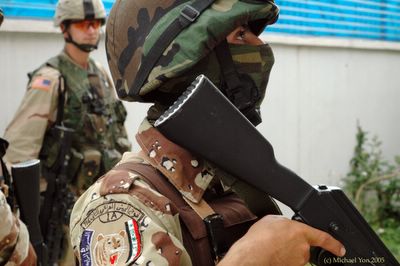
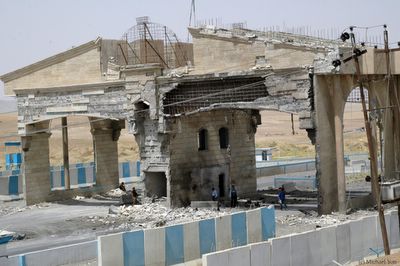

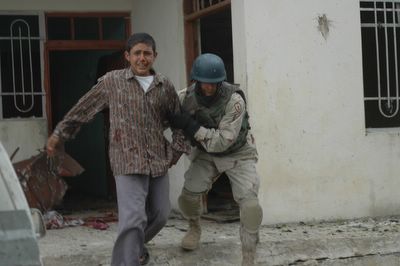
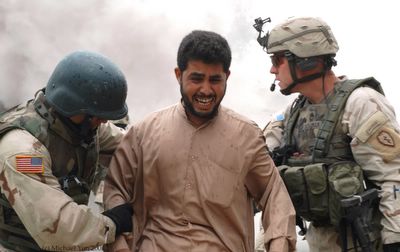
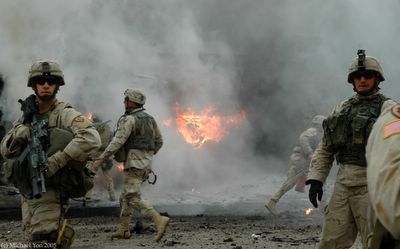
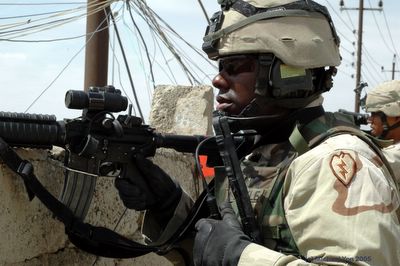
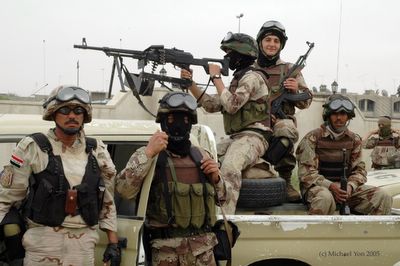
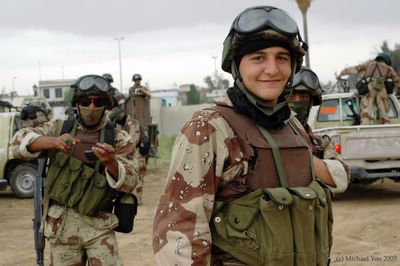
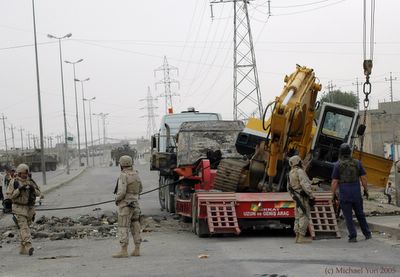

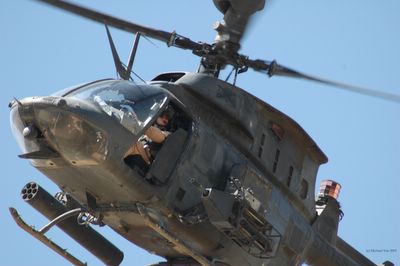
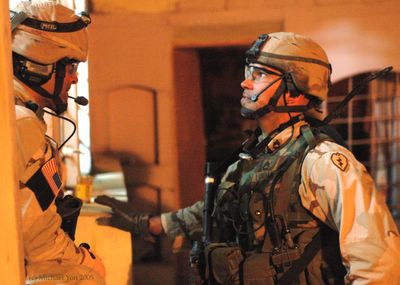


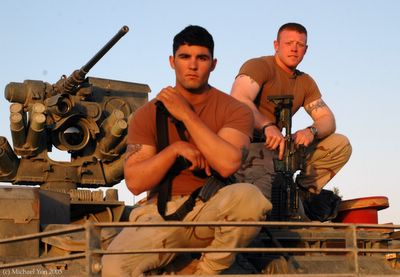

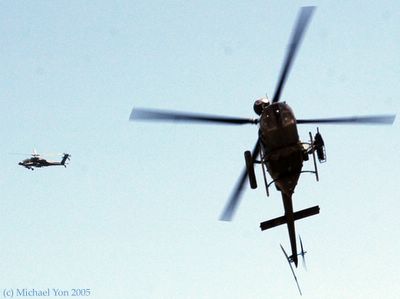

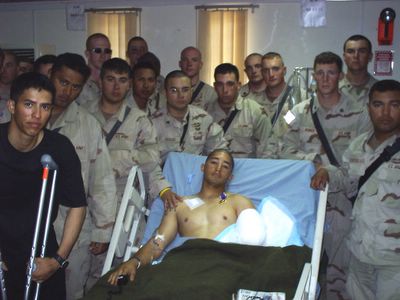






<< Home